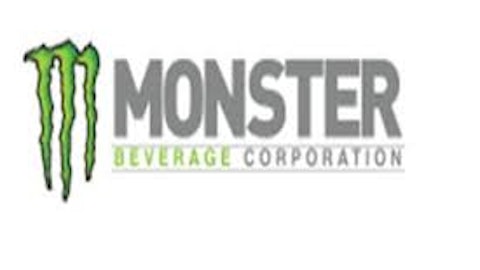Editor’s Note: The original article stated the AMA would get behind a ban on energy drinks; this is incorrect. This article has been amended and Motley Fool apologizes for the error.
Shares of Monster Beverage Corp (NASDAQ:MNST)s fell recently as energy drinks continue to undergo scrutiny by government officials. The American Medical Association announced a discussion of a resolution to ban energy drinks for those under 18, leading many to wonder what would happen to these companies if the resolution was adopted.
Until recently, Monster Beverage Corp (NASDAQ:MNST) was a great stock for investors, reporting a 6.5% increase in net profits for its first quarter. At that time, Monster Beverage Corp (NASDAQ:MNST) held a 32.7% share of the market, beaten only slightly by Red Bull, which held 35% of the market.
Soda market down
The news was dismal for the soda industry earlier this year as energy drinks continued to push them to second place. When PepsiCo, Inc. (NYSE:PEP) announced its quarterly earnings, sales were down for the third year in a row. Net income for the company was down $1.08 billion from $1.13 billion the previous year.
At the same time, sales of energy drinks have risen, jumping 14.3% in 2012. Including more caffeine than coffee, the drinks are especially popular with young people, leading to the health concerns making headlines today.
The concerns have become so prevalent that medical professionals and health organizations are now asking the U.S. Food and Drug Administration to regulate energy drinks. This comes on the heels of an increase in emergency room visits due to the drinks, says the Associated Press. For energy drink specialists like Red Bull, tight regulation or a full-out ban could spell the end. But for companies like PepsiCo, Inc. (NYSE:PEP), it might just be the push that consumers need to return to regular carbonated beverages.
Not one to be outdone, The Coca-Cola Company (NYSE:KO) released its Full Throttle energy drink in 2004. But the drink has never quite caught on like its competitors, holding only 1.28% of the energy drink market despite aggressive advertising.
The shift toward energy drinks doesn’t seem to have phased The Coca-Cola Company (NYSE:KO), however. Consistently one of the best-performing brands in the world, The Coca-Cola Company (NYSE:KO) sales have grown 10% over the past five years. The Coca-Cola Company (NYSE:KO) builds its brand by never relaxing its marketing strategy. The company continues to bombard the public with advertisements, with its ads becoming a part of American culture. As a result, Interbrand named it the world’s most valuable brand in 2011.
Will energy drinks fail?
If a ban on energy drinks goes through, stores will be unable to sell energy drinks to consumers under the age of 18. Will this impact stock valuation? Earnings could decrease, since many energy drink consumers are under the age of 18; those consumers also are rarely the ones to do the household grocery shopping, however. It would not impact the college-age and twenty-something demographic of energy drink consumers.
Gas stations and vending machines may be the biggest change for energy drinks if a ban goes in place. With teens no longer able to purchase Monster Beverage Corp (NASDAQ:MNST), Red Bull, or Full Throttle while out on the town with friends, sales may be impacted.
In the meantime, The Coca-Cola Company (NYSE:KO) and PepsiCo, Inc. (NYSE:PEP) will still hold the market, as they have for more than a century. The beverage market may change over time, but these two companies always hold strong.
Stephanie Faris has no position in any stocks mentioned. The Motley Fool recommends Coca-Cola, Monster Beverage, and PepsiCo. The Motley Fool owns shares of Monster Beverage and PepsiCo. Stephanie is a member of The Motley Fool Blog Network — entries represent the personal opinion of the blogger and are not formally edited.
The article Will an Energy Drink Ban Impact the Soda Market? originally appeared on Fool.com is written by Stephanie Faris.
Copyright © 1995 – 2013 The Motley Fool, LLC. All rights reserved. The Motley Fool has a disclosure policy.





